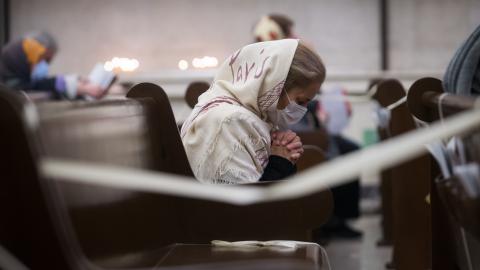The first tremor of distress rippled across Iran on Sept. 16, 2022, after the tragic death of a beautiful young woman—Mahsa Amini, also known as Jina Amini. Twitter watchers first saw a photo of Mahsa, unconscious and on life-support, the victim of a vicious beating by Iran's "religious morality" police. They had arrested and violently assaulted her for not wearing her hijab properly—some of her hair had been exposed. She quickly died of a massive brain injury.
After her death, rage erupted and spilled furiously into the streets of Tehran and Mahsa's hometown, Saqqez, in Iran's Kurdistan Province. For the first time in a long time Iran's women and girls led the way. Since 1979, females had been radically marginalized by the regime's Islamist religious strictures, and now by the thousands they furiously tore off their hijabs, burned them publicly and chanted, "Women, Life, Freedom!" and "Death to the dictator!" In the hours and days that followed they were joined by angry males—young and old—who aggressively joined the violent protests. Today the demonstrations have spread like wildfire across Iran and reached virtually every population center in the country.
These are far from the first demonstrations against the regime since its founding, but the 2022 protests are more widespread and relentless than ever before—growing and gaining participation from virtually every ethnic and religious group in the country. Even Iran's largely underground and at-risk Christian community has spoken out publicly against the regime for the first time. In September they released a declaration with 300 signatories which stated, "We Christians have not been spared from the brutal repressions since the first day that the Islamic Republic stepped into our country — from serial murders to imprisonment, torture, humiliation, rejection, flogging, exile, forced veiling, deprivation of privacy even in our own homes, deprivation of work and education, confiscation of property and destruction of our churches, which are only part of the regime's desperate attempt to crush us. ... We share in the cost of fighting for Iran's freedom from captivity and darkness."
Saghar Kasraie, an Iranian-born Christian activist based in the U.S., is greatly encouraged by the widespread agreement among the various protestors. She told me, "Everybody is involved in these demonstrations and the chants reflect one united voice. There are no ethnic divisions at all—truck drivers, university students who won't go to class, soccer fans who prayed the country's team would lose to the USA, ophthalmologists protesting pellets shot in the eyes of protestors, the famous rapper Toomaj Salehi, who has been arrested and is at high risk. Because the regime is deliberately shooting into the crowds, there are funerals every day, but the demonstrators are determined to hold their ground until the end. And the protesting Christians are part of this bigger picture."
There are some exceptions. Iran's Assyrian Church has experienced tensions between its older leadership—who have shunned the protests—and its younger believers, who have taken to the streets. "Yes, we are Assyrian," they have responded, "but we are also Iranian, and we live in this country. It's our country too!" Still other Christians—converts from Islam—are estimated to comprise more than a million believers. They too have been reluctant to draw attention to themselves due to the risk of deadly apostasy indictments they might face.
Article18 is a nonprofit organization based in London, dedicated to the protection and promotion of religious freedom in Iran; they advocate on behalf of Iran's persecuted Christians and report on their arrests. I spoke to Mansour Borji, Article18's director, who provided a fresh perspective on today's revolutionary demonstrations.
"This is massively different from the Christian community's engagement with previous protests and popular uprisings. In the past, they not only struggled with dictatorial demands of an authoritarian regime inside the country, but were also theologically unprepared to discern the right course of action in these complex situations," he said.
Of course, serious questions remain: Will Mahsa Amini's tragic death mark the beginning of the end of the Ayatollahs' dictatorship? How many lives will be lost? And will the protestors who continue to risk their lives succeed? Human rights activists in Iran reported on Nov. 28, that "451 protesters and 60 security forces have been killed since the start of the unrest and that more than 18,000 people have been detained." The regime admitted to 300 protestor deaths.
Mansour Borji concluded, "This oppressive regime has proven to be fundamentally unable to reform. I have no doubt that they are on their way out. How long this will take? I am not sure. But people of Iran are determined to see them go, and they honor the many lives already lost in this revolution."
Read in Newsweek.















